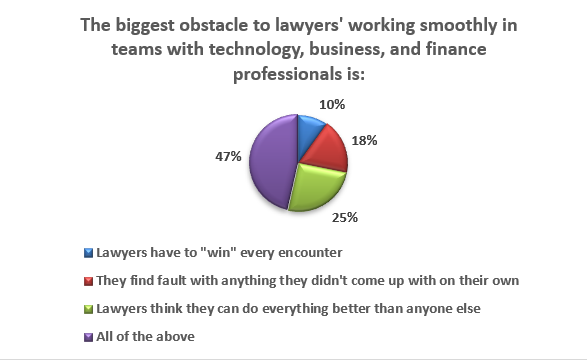The following column is by Janet Stanton, Partner, Adam Smith, Esq.
Maybe lawyers didn’t go on play dates when they were little. (Maybe they didn’t want to.)
And, once they get through law school, any shred of esprit de corps has been beaten out of them.
This may help explain the results of our recent Question of the Month on the inability of lawyers to work well with business professionals at their firm. Our readers were asked what was the “biggest obstacle to lawyers’ working smoothly in teams with technology, business and finance professionals.” Given the choices of (1) “Lawyers have to win every encounter,” (2) “They find fault with anything they didn’t come up with,” (3) “Lawyers think they can do everything better than any one else,” or (4) “All of the above” – nearly half of respondents (47%) voted for #4, “All of the above.” (And, mind you, our readership is composed largely of lawyers.)
Of the other choices, 25% of respondents opted for “Lawyers think they can do everything better than anyone else.” A wise and frequent commentator to the site opined a nuanced, but distinctly different version of that: “[Lawyers] regard what they can do as being far more important than anything else.”
One of the younger members of the Bar (who also works in tech) provided this trenchant comment: “I noticed that attorneys are not used to going through the iterative process necessary to come up with tech-driven solutions. If a version 1.0 has a bug – which they all do – attorneys often dismiss the product, are biased against the product after the initial bug is discovered, and lose interest in participating in the tech solution beyond one or two versions.”
But seriously – why is this so? We have been puzzled by this for years and must admit, we’ve never come up with a plausible explanation. I certainly experienced this phenom first-hand during my tenure in Law Land – at an AmLaw 50 firm with a reputation of being innovative. The disregard for my (frankly) unassailable credentials in an area foreign to most lawyers was almost disorienting. (I’m OK now.)
We’ve written extensively on the, um, distinctive aspects of “lawyer psychology” (thank you, Dr. Larry Richard – the guru on this topic). Lawyers’ sky-high level of skepticism combined with almost equally strong need for “autonomy” (i.e., “I won’t be managed.”), low levels of “resilience” – and almost negligible levels of “sociability” certainly does not look like a recipe for collaboration nor openness to others’ opinions.
This may have been OK in the “good old days” (say, before the Great Recession – now 10 years past). But it’s just not going to cut it in the new environment we find ourselves in. In a no-growth segment – actually declining in real dollars – the only ones that count – the battle for market share among firms continues to ratchet up. Moreover, as we know, competition is not restricted to just other law firms; both in-house and New Law are increasing their share of the legal services market (need I say, at the expense of law firms).
Certainly, some firms get it. There’s a large body of research showing a widening gap in financial performance between “winning” law firms and the rest of the pack. This is true in every segment and geography – confirmed by our own “shoe leather” research in a wide variety of international markets among a broad swath of legal providers.
One of the defining characteristics of these “winning” firms is that they boast a strong cadre of business professionals who work along side, as equals to their lawyer colleagues (did I hear gasps?). These are credentialed professionals in operations, finance, strategy, technology, talent recruitment/-development, marketing, pricing, business process optimization, etc. – where having a law degree is irrelevant. Some of these winning firms have intellectually diverse, client-facing teams that include lawyers and business professionals.
So, the remedy for law firms? Hire the best credentialed business professionals you can find, compensate them commensurate with their role and let them do their thing without looking over their shoulders. And, even if you don’t respect them at first – pretend that you do; you may just begin to and see the value they bring to your firm. No play dates required.





I think your second line says it all. From Day 1, lawyers are trained to be lone wolves. Rise and fall on your own efforts. That mental process is continuously reinforced in laws firms as associates run the partnership gauntlet.
But as you say, some firms are starting to get it. Brands (the sum total of the teamwork) win?
Hi Skeptic –
Thanks for this. This is thrown into sharper relief when one compares the “lone wolf” experience at law school versus the strong team orientation at business schools.
And, yes, we’re seeing “brand” as an indicator of the more successful firms.
You may be conflating the success of high-level, marquee brands with the virtues of collaboration. There are a few firms that draw clients with brand reputation. Yet, they almost always compensate partners on an EWYK basis, and I don’t see any consistent treatment of non-lawyer managers as peers. It’s more a classic front office-back office paradigm.
And for most other firms, where rainmakers drive business acquisition, collaboration is irrelevant.
The question is whether this is a winner take all game in which the handful of large firms at the top of each market segment can overwhelm the others with back office support and branding, or whether, outside the rarefied areas of capital markets, IP and similar high margin practices, the rainmaker model survives.
This is a great piece, Janet.
There is a fairly obvious answer here:
A disproportionate number of lawyers are assholes, as measured against other professions and the general population.
As a lawyer, I have seen this and more than likely been this.